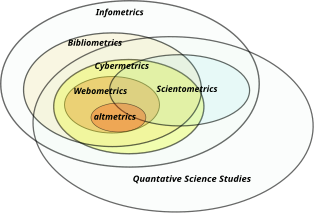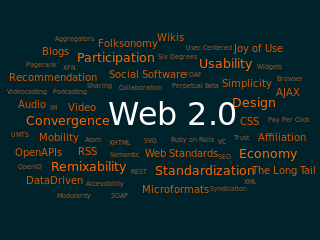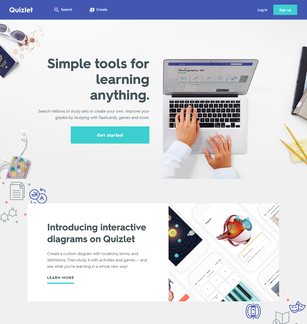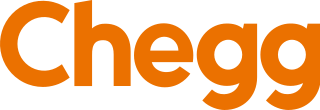The Semantic Web, sometimes known as Web 3.0, is an extension of the World Wide Web through standards set by the World Wide Web Consortium (W3C). The goal of the Semantic Web is to make Internet data machine-readable.

A wiki is an online hypertext publication collaboratively edited and managed by its own audience, using a web browser. A typical wiki contains multiple pages for the subjects or scope of the project, and could be either open to the public or limited to use within an organization for maintaining its internal knowledge base.

In computing, a hyperlink, or simply a link, is a digital reference to data that the user can follow or be guided to by clicking or tapping. A hyperlink points to a whole document or to a specific element within a document. Hypertext is text with hyperlinks. The text that is linked from is known as anchor text. A software system that is used for viewing and creating hypertext is a hypertext system, and to create a hyperlink is to hyperlink. A user following hyperlinks is said to navigate or browse the hypertext.

Information science is an academic field which is primarily concerned with analysis, collection, classification, manipulation, storage, retrieval, movement, dissemination, and protection of information. Practitioners within and outside the field study the application and the usage of knowledge in organizations in addition to the interaction between people, organizations, and any existing information systems with the aim of creating, replacing, improving, or understanding the information systems.
Social software, also known as social apps or social platform includes communications and interactive tools that are often based on the Internet. Communication tools typically handle capturing, storing and presenting communication, usually written but increasingly including audio and video as well. Interactive tools handle mediated interactions between a pair or group of users. They focus on establishing and maintaining a connection among users, facilitating the mechanics of conversation and talk. Social software generally refers to software that makes collaborative behaviour, the organisation and moulding of communities, self-expression, social interaction and feedback possible for individuals. Another element of the existing definition of social software is that it allows for the structured mediation of opinion between people, in a centralized or self-regulating manner. The most improved area for social software is that Web 2.0 applications can all promote co-operation between people and the creation of online communities more than ever before. The opportunities offered by social software are instant connections and opportunities to learn.An additional defining feature of social software is that apart from interaction and collaboration, it aggregates the collective behaviour of its users, allowing not only crowds to learn from an individual but individuals to learn from the crowds as well. Hence, the interactions enabled by social software can be one-on-one, one-to-many, or many-to-many.
Social bookmarking is an online service which allows users to add, annotate, edit, and share bookmarks of web documents. Many online bookmark management services have launched since 1996; Delicious, founded in 2003, popularized the terms "social bookmarking" and "tagging". Tagging is a significant feature of social bookmarking systems, allowing users to organize their bookmarks and develop shared vocabularies known as folksonomies.
Academic dishonesty, academic misconduct,academic fraud and academic integrity are related concepts that refer to various actions on the part of students that go against the expected norms of a school, university or other learning institution. Definitions of academic misconduct are usually outlined in institutional policies. Therefore, academic dishonesty consists of many different categories of behaviour, as opposed to being a singular concept.
Social computing is an area of computer science that is concerned with the intersection of social behavior and computational systems. It is based on creating or recreating social conventions and social contexts through the use of software and technology. Thus, blogs, email, instant messaging, social network services, wikis, social bookmarking and other instances of what is often called social software illustrate ideas from social computing.

In information systems, a tag is a keyword or term assigned to a piece of information. This kind of metadata helps describe an item and allows it to be found again by browsing or searching. Tags are generally chosen informally and personally by the item's creator or by its viewer, depending on the system, although they may also be chosen from a controlled vocabulary.

Geni is an American commercial genealogy and social networking website, founded in 2006, and owned by MyHeritage, an Israeli private company, since November 2012. As of 2021, MyHeritage has kept its genealogical website separate from Geni's website, though the Smart Matches™ feature enables matching of Geni profiles to trees on MyHeritage and to other family tree sites and digitized records.

Microsoft OneDrive is a file hosting service operated by Microsoft. First launched in August 2007, it enables registered users to share and synchronize their files. OneDrive also works as the storage backend of the web version of Microsoft Office. OneDrive offers 5 GB of storage space free of charge, with 100 GB, 1 TB, and 6 TB storage options available either separately or with Microsoft 365 subscriptions.
Content creation is the act of producing and sharing information or media content for specific audiences, particularly in digital contexts. According to the Merriam-Webster dictionary, content refers to "something that is to be expressed through some medium, as speech, writing or any of various arts" for self-expression, distribution, marketing and/or publication. Content creation encompasses various activities including maintaining and updating web sites, blogging, article writing, photography, videography, online commentary, the maintenance of social media accounts, and editing and distribution of digital media. In a survey conducted by Pew, content creation was defined as "the material people contribute to the online world."

Outlook.com, formerly named Hotmail, is a webmail service that is part of the Microsoft 365 product family. It offers mail, calendaring, contacts, and tasks services.
Scribd Inc. is an American e-book and audiobook subscription service that includes one million titles. Scribd hosts 60 million documents on its open publishing platform.
A web browser is a software application for retrieving, presenting and traversing information resources on the World Wide Web. It further provides for the capture or input of information which may be returned to the presenting system, then stored or processed as necessary. The method of accessing a particular page or content is achieved by entering its address, known as a Uniform Resource Identifier or URI. This may be a web page, image, video, or other piece of content. Hyperlinks present in resources enable users easily to navigate their browsers to related resources. A web browser can also be defined as an application software or program designed to enable users to access, retrieve and view documents and other resources on the Internet.

Quizlet is a multi-national American company that provides tools for studying and learning. It was founded by Andrew Sutherland in October 2005 and released to the public in January 2007. Quizlet's primary products include digital flash cards, matching games, practice electronic assessments, and live quizzes. In 2017, 1 in 2 high school students used Quizlet. As of December 2021, Quizlet has over 500 million user-generated flashcard sets and more than 60 million active users.
Social learning tools are tools used for pedagogical and andragogical purposes that utilize social software and/or social media in order to facilitate learning through interactions between individuals and systems. The idea of setting up "social learning tools" is to make education more convenient and widespread. It also allows an interaction between users and/or the software which can bring a different aspect to learning. People can acquire knowledge by distance learning tools, for instance, Facebook, Twitter, Khan Academy and so on. Social learning tools may mediate in formal or informal learning environments to help create connections between learners, instructors and information. These connections form dynamic knowledge networks. Social learning tools are used in schools for teaching/learning and in businesses for training. Within a school environment, the use of social learning tools can affect not only the user (student) but his/her caretaker as well as his/her instructor. It brings a different approach to the traditional way of learning which affects the student and his/her support circle. Companies also use social learning tools. They used them to improve knowledge transfer within departments and across teams. Businesses use a variety of these tools to create a social learning environment. They are also used in company settings to help improve team work, problem solving, and performance in stressful situations.

Chegg, Inc., is an American education technology company based in Santa Clara, California. It provides homework help, digital and physical textbook rentals, textbooks, online tutoring, and other student services.

Docstoc was an electronic document repository and online store, aimed at providing professional, financial and legal documents for the business community. It closed in 2015. Users could upload, share and sell their own documents, or purchase professional documents written in-house by professionals and lawyers.
Meta Platforms Inc., or Meta for short, has faced a number of privacy concerns. These stem partly from the company’s revenue model that involves selling information collected about its users for many things including advertisement targeting. Meta Platforms Inc. has also been a part of many data breaches that have occurred within the company. These issues and others are further described including user data concerns, vulnerabilities in the company’s platform, investigations by pressure groups and government agencies, and even issues with students. In addition, employers and other organizations/individuals have been known to use Meta Platforms Inc. for their own purposes. As a result, individuals’ identities and private information have sometimes been compromised without their permission. In response to these growing privacy concerns, some pressure groups and government agencies have increasingly asserted the users’ right to privacy and to be able to control their personal data.









